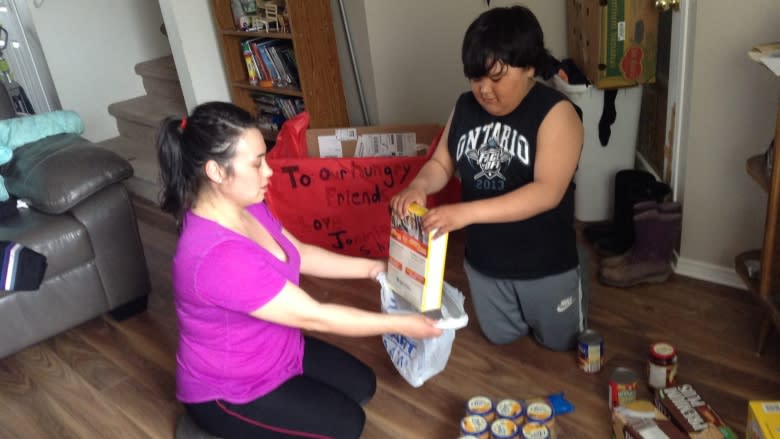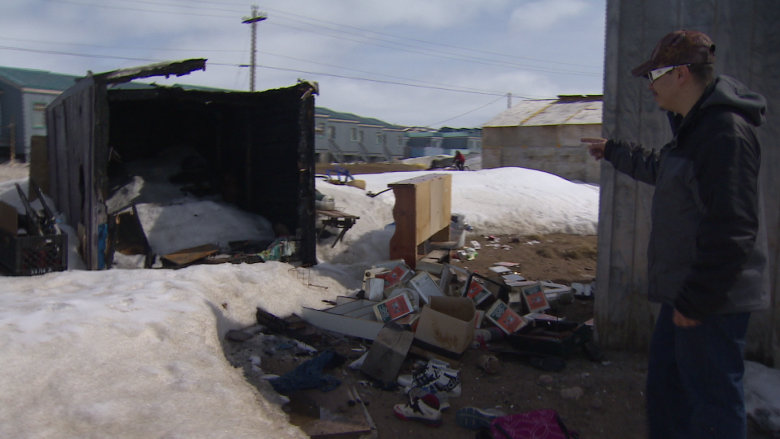'To give them hope': 3 Iqaluit locals help homeless living in abandoned shacks
Three people in Iqaluit are stepping up to help what they say are more than 100 homeless living mainly in shacks and abandoned boats on the beach.
Linda Shaimaiyuk and Jayko Langer started delivering food and supplies to the homeless two weeks ago.
They're helping their friend, Qaumariaq Inuqtaqau, who's been collecting and dolling out donations for 14 months.
"It's good to show them that there are people who care about them and think about them. To give them hope," Inuqtaqau said.
Inuqtaqau has been co-ordinating with members of the Helping our Northern Neighbours Facebook group to get dry goods mailed up from southern Canada.
Recently, he also delivered food collected by the students of Joamie elementary school.
He's says he's looking to give out sleeping bags, winter gear, flashlights, first aid kits, food, clothing and fuel to Iqaluit's homeless.
Right now, the main means of connecting with him to donate goods is through Facebook, but he's starting to think bigger.
For the year he was on his own, he took cabs and walked to hand out donations, but with Shaimaiyuk and her husband Langer pitching in, they've been reaching out to companies and organizations soliciting donations.
"We're going to form an organization, [businesses] want things in writing. I think more people will want to step up," Langer said.
'I just need a place to stay'
Inuqtaqau called the living conditions in the shacks "inhumane."
"You can't breathe. You can't open your eyes because of the gas fumes in there — that's very dangerous."
This summer, he would like to help build more shacks to replace ones that have burned down, in addition to continuing bi-weekly donations throughout the year.
Inuqtaqau says some of the people he helps feed have jobs, but are unable to find housing because of the shortage in town.
- RELATED | Employed and homeless: Housing crisis in Nunavut hamlet forces shelter to expand
He also visits overcrowded homes to drop-off supplies, so he says he understands why some people resort to staying in shacks, saying they feel the need to take responsibility for themselves and avoid the stress of family.
Everton Lewis lost his housing five or six years ago and has been homeless ever since, though he says he has again applied for housing.
"I'll always try to find another way to survive, you know what I mean? I figure I just need a place to stay. The sky is my roof and the world is my home."
He stays in an abandoned boat and says he is thankful for the donations.
"They'll last a while because I really don't eat much," he said. "I eat when I am very very hungry, but usually I am drinking coffee, tea, water. I drink more than I eat."
More government support needed
Inuqtaqau says the federal and territorial governments need to do more, citing mouldy and insufficient public housing.
A 2015-2016 report, "A Framework for Action for Nunavut's Absolute Homeless" reported there are 5,153 public housing units in Nunavut and approximately 38 per cent of those are overcrowded, resulting in a years-long wait list for housing.
The housing shortage results in people staying in unhealthy relationships or remaining in correctional facilities or medical institutions longer than they need to.
"Others have no place to go and are forced to seek shelter in places not meant to be housing and to endure the extreme climate and harsh conditions of our environment," the report said.
A 2014 study reported that there were 57 people relying on emergency shelters in Iqaluit, but did not count those "couch surfing" in overcrowded homes.





